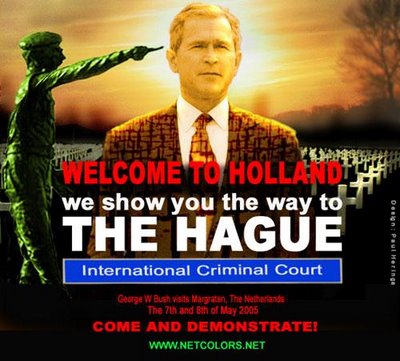Pentagon breaks with Bush on detentions
 After five years of arguing that Geneva does not apply to prisoners captured in Afghanistan and Iraq, the Pentagon, reacting to the Hamdan verdict, have finally split with the Bush administration and admitted that the rules of war apply to the war on terror.
After five years of arguing that Geneva does not apply to prisoners captured in Afghanistan and Iraq, the Pentagon, reacting to the Hamdan verdict, have finally split with the Bush administration and admitted that the rules of war apply to the war on terror.
It's a humiliating climb down from what was always a shameful position.
The Pentagon's second in command Gordon England wrote:"I request that you promptly review all relevant directives, regulations, policies, practices and procedures" to bring them in line with protections under article three of the Geneva convention, Mr England wrote. Article three outlaws torture and humiliating and degrading treatment, and says prisoners are entitled to a hearing by a regularly constituted court. Yesterday's memo was a direct result of last month's supreme court decision which ruled that the Bush administration's military tribunals for the detainees were illegal.
The Bush administration has always insisted that it treated prisoners at Guantanamo Bay humanely.However, a report this week from the Centre for Constitutional Rights on conditions at Guantánamo describes interrogations of hooded prisoners with snarling dogs, sleep deprivation that lasted for months, solitary confinement for periods of up to a year, and threats of transfer to countries that practise torture.
The Pentagon may have split with the administration but there is no guarantee that the administration will adhere to the Geneva Conventions.In the first of three days of hearings in Congress on the treatment of detainees, Steven Bradbury, of the justice department's office of legal counsel, told senators the Geneva convention protections were ambiguous and poorly defined.
The Bush administration, despite their loss at the Supreme Court, continue to look for holes in the Convention that Gonzales referred to as "quaint".
Indeed, Newsweek reports on the fallout over Gitmo and on the original intentions of it's creators.White House hard-liners, led by Vice President Dick Cheney and his uncompromising lawyer, David Addington, made it clear that there was only one acceptable answer. One day, Bowker recalls, a colleague explained the goal: to "find the legal equivalent of outer space"—a "lawless" universe. As Bowker understood it, the idea was to create a system where detainees would have no legal rights and U.S courts would have no power to intervene.
The people who would seek to create "a legal equivalent of outer space" are obviously not people who have any respect for the rule of law.
Indeed, their stated aim is to circumvent it.
So it is safe to assume that we are dealing with thugs here. And, as we all know, thugs are unlikely to obey a law simply because it exists.
Bush and Cheney have been told that their bizarre reading of the law is flat wrong. However, I still have no great faith that they will change their behaviour simply because they have been told it is wrong.
Indeed, when Tony Snow says, "We are going to do this in a way that is consistent with national security", I feel myself shuddering.
They are continuing to look for loopholes in the law. Criminal minds always do. And this White House is populated by criminals.
Only these criminals are committing war crimes.
Click title for full article.























No comments:
Post a Comment